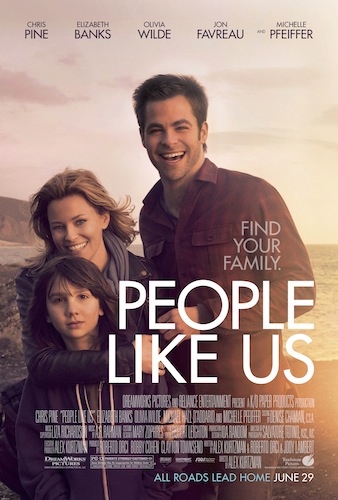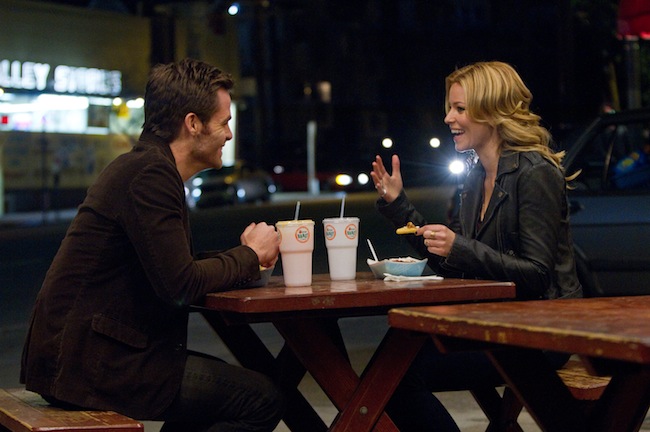
There’s a thick layer of awkward that constantly sits atop Alex Kurtzman’s directorial debut PEOPLE LIKE US (he also penned the script with longtime partner Bob Orci and Jody Lambert). The film attempts to mesh two parallel lives, Sam (Chris Pine) and Frankie (Elizabeth Banks), who share the commonality of having the same shitty father – different moms though. When Sam returns home after the death of Dad, he learns that he had this secret half-sister that no one ever told him about. He has strict instructions to give this woman and her son $150,000 left behind in his father’s will, while he had to settle on an extensive record collection. However, while he’s trying to figure out how to break the news, he’s getting closer to the family, integrating himself in their lives, borrowing from the romantic comedy conceit of not telling the truth in the beginning, so things only get more complicated later on when the reveal becomes a must. But this isn’t a romantic comedy… this is a situation involving a severely fractured family, in the way that neither side ever knew the other existed. Therefore, no matter how smooth Chris Pine can be or how strong-willed Banks comes across as, there’s a weird incestuous vibe that plagues their budding relationship together. When the movie examines their individual paths of how they got to where they are today or their experiences with a less than ideal father, PEOPLE LIKE US does have something good going for it. But… and I get the whole “How do you tell someone you’re their long lost brother?” dilemma… as much time as they spend together, there’s this worry plaguing the film that sis is going to put the moves on big brother, because she doesn’t know any better. It’s a dreadful feeling that hurts the movie, but Kurtzman is never able to resolve their relationship effectively enough as platonic, because Banks and Pine have an on-screen chemistry that can’t be hidden by the simple suggestion that they’re supposed to be family sort of.
The most intriguing idea PEOPLE LIKE US works with is the dichotomy of Sam and Frankie’s relationship with the same man. He was an absent father to both really, ignoring his full-time family for his music producing career, and then leaving behind his other family for the full-time family, which he didn’t spend much time with to begin with. Sam had some access to his father, yet wishes it was less, because of the contentious nature of their relationship over time, as a result of having a dad who was never there. Frankie, on the other hand, wishes she had more, because, in the limited time she spent with him, she felt like she had a real dad. But it’s easy to assume she would have found herself in a similar predicament as her half-brother.

That really turns into a captivating scenario, due to Pine and Banks. Pine is able to let the pain of what he had with his father shine through his fast-talking, wheeling-dealing ways, and there’s a vulnerability to Banks, as a woman whose lack of a father figure surely contributed to all the other things that have come up less than rosy throughout her life. There’s a tough shell to Frankie, but, as with Pine, you can see it’s merely a cover for the mess that was left behind by having one shitty parent.
There’s a kid involved, too, but the character never does more than annoy or irritate, because, even with the hard work his mom is putting in to try to give him the best she can, he never strays from being an asshole, until he has his own father figure in Sam step in to set him straight. Sure, it’s another level to the damage having an absent parent can do, but it’s not nearly as effective as the deeper material Banks and Pine are working with, because young Josh (Michael Hall D’Addario) only comes across as ungrateful for the efforts in the overall equation.
PEOPLE LIKE US also decides to get way too sentimental with its 157 feel-good endings tacked on, in what feels like an extra 20 minutes of resolution that should have been capped at maybe one or two threads being nicely wrapped up. It may only be a shade under two hours, but not even the third act, but the ending itself feels like forever, never knowing when to pull the plug and send us on our merry way.
The emotion of Pine and Banks makes PEOPLE LIKE US better, but the weird vibes of their relationship ultimately torpedo a lot of that. It’s not the disaster of Kurtzman and Orci’s COWBOYS & ALIENS or TRANSFORMERS 2, proving that they indeed are capable of creating a film that doesn’t insult your intelligence. Perhaps this is the beginning of them doing something better, which isn’t a bad starting point at all.
-Billy Donnelly
"The Infamous Billy The Kidd"
Follow me on Twitter.
![]()
